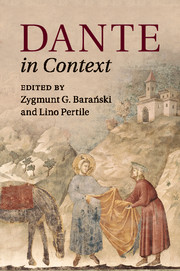Book contents
- Frontmatter
- Dedication
- Contents
- List of illustrations
- List of maps
- Notes on contributors
- Chronology
- Abbreviations and note on translations
- Introduction
- Part I Politics and society
- Part II Intellectual traditions
- Part III Linguistic and literary cultures
- 15 Linguistic Italy
- 16 Education
- 17 Rhetoric, literary theory, and practical criticism
- 18 Classical antiquity
- 19 Religious culture
- 20 Visions and journeys
- 21 Historical and political writing
- 22 Vernacular literatures
- 23 Popular culture
- Part IV Visual and performative culture
- Part V Dante: life, works, and reception
- Further reading
- Index
20 - Visions and journeys
from Part III - Linguistic and literary cultures
Published online by Cambridge University Press: 05 October 2015
- Frontmatter
- Dedication
- Contents
- List of illustrations
- List of maps
- Notes on contributors
- Chronology
- Abbreviations and note on translations
- Introduction
- Part I Politics and society
- Part II Intellectual traditions
- Part III Linguistic and literary cultures
- 15 Linguistic Italy
- 16 Education
- 17 Rhetoric, literary theory, and practical criticism
- 18 Classical antiquity
- 19 Religious culture
- 20 Visions and journeys
- 21 Historical and political writing
- 22 Vernacular literatures
- 23 Popular culture
- Part IV Visual and performative culture
- Part V Dante: life, works, and reception
- Further reading
- Index
Summary
When Dante began writing his Commedia around 1306, European literature was rich with works that provided a fertile ground for constructing his account of a journey in the otherworld. The two closely related genres – voyage and vision – were integral aspects of this literary domain. While the distinction between these two venerable forms should be quite clear to the modern reader, in the Middle Ages voyage literature could often be as hypothetical as vision literature. Both shared a common projection of the hero into the unknown – an experience that often engendered a crisis, resulting in the opportunity for the hero's personal conversion based on accumulated experience, knowledge, and insight. Epic stories from the classical period often combined voyage and vision. Heroes like Odysseus and Aeneas wandered a Mediterranean both real and imaginary, and both visited the underworld in tales that are mirrored in quite a significant body of medieval vision literature, including especially the Commedia. Despite their commonalities, it is best to consider these genres of voyage and vision separately to appreciate fully their vitality and complexity at the beginning of the fourteenth century.
Let us begin with the voyage. Although the great age of discovery was still two centuries in the future, fourteenth-century Europe was not without an interest in the outside world, in travel and adventure, in foreign lands and peoples. Although real travel was circumscribed for most medieval people, many accounts were careful records of actual journeys. Travellers embarked on journeys for much the same reasons as they have always done. The first reason would have been intellectual, motivated by curiosity and a quest for knowledge about the surrounding world. The second would have been personal – the journey taken in search of self-transformation. Under this rubric would be counted both pilgrimage and adventure, including crusade, which had aspects of both military adventure and spiritual pilgrimage. The third would have been pragmatic, pursuing trade, diplomacy, or patronage in distant lands. Often travellers' accounts reveal a combination of motivations, and sometimes no clear motivation at all.
Yet many travel accounts relied on imagination and fantasy. Imaginary worlds were created on top of the real world as background and setting for heroic tales. The origins for this practice date back as far as the epic of Gilgamesh (eighteenth century BCE).
- Type
- Chapter
- Information
- Dante in Context , pp. 341 - 353Publisher: Cambridge University PressPrint publication year: 2015



